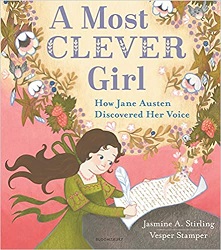
 A Most Clever Girl
A Most Clever GirlHow Jane Austen Discovered Her Voice
Review posted June 24, 2021.
Bloomsbury Children’s Books, 2021. 44 pages.
Review written June 16, 2021, from a library book
Starred Review
How do you tell kids about the life of a novelist who writes books for adults? Jasmine Stirling talks about Jane Austen’s supportive family and life circumstances growing up. But she also, in a simple way, explains what kind of writing was prevalent in Jane’s day and how she made fun of it. Here’s how the book begins:
Jane loved stories – long ones, short ones, worn and new.
But there were some kinds of stories that she just couldn’t stand.
These were pale stories with delicate ladies who fainted all the time. (ALAS!)
Or gloomy stories with orphans on doorsteps and terrible secrets in the attic. (OOOH!)
Or sticky-sweet stories where people fell in love at first sight. (EWW!)
This was the fluff that was fashionable in those days. Jane found it, well, stale. And predictable.
You see, Jane had a lively, playful disposition, which delighted in anything ridiculous.
Jane started writing silly stories that poked fun at the fluff.
In one, a pair of pale ladies took turns fainting on a sofa. (ALAS!)
In another, a mother abandoned her baby under a haystack only to discover her alive . . . weeks later. (OOOH!)
In yet another, two children were so hungry they bit off their mother’s fingers. (EWW!)
After this engaging beginning, the book goes on to tell about the circumstances of her life. How her father encouraged her writing. (I love the inclusion of the writing desk he gave her, since I’ve seen that desk in the British Library, and when I did, it brought tears to my eyes.)
But then money got tight, they moved to Bath, and Jane’s father died. The book takes us through those events and on to the time when her brother gave Jane and her sister and mother a cottage to live in. There, Jane began writing again and found her voice.
The illustrator explains at the back how much she enjoyed researching on location. She uses pink to represent youthful playfulness, gray for the hard years, and green as Jane found new maturity.
This book came along just in time for the Jane Austen virtual symposium I’m attending beginning the day after I'm writing this review. The author is going to be speaking and talking about how she attempted to convey Jane Austen’s life in picture book form. I’m looking forward to hearing her speak, already impressed with the results of her work.
